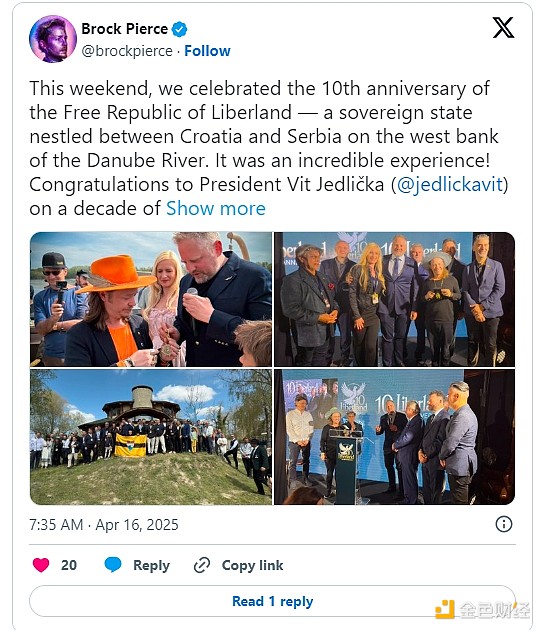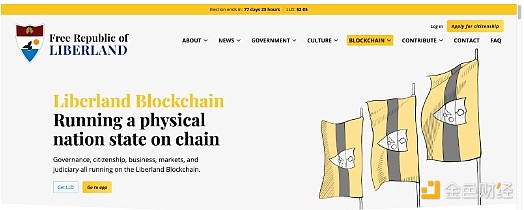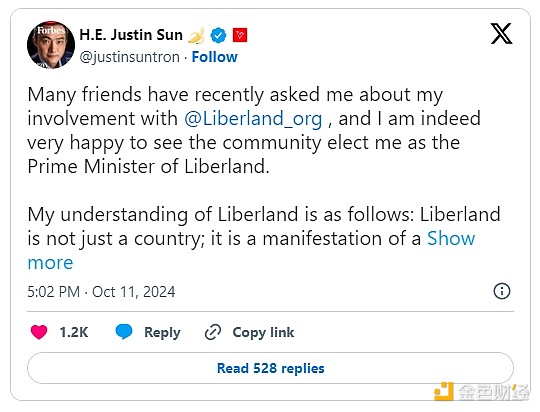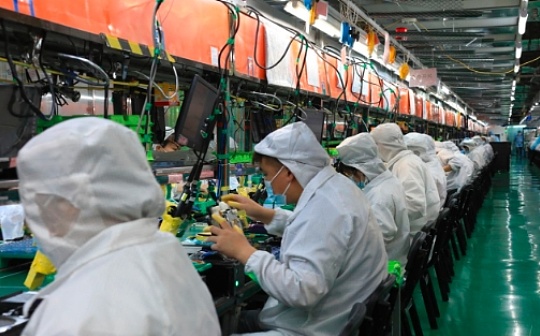Ten years passed Liberland requires Bitcoin standards more than ever

Reprinted from jinse
04/17/2025·2DAuthor: David Canellis, Blockworks; Compilation: White Water, Golden Finance
The land of freedom has fallen.
This story is almost as old as Bitcoin itself. One day, you bought a little bit of Bitcoin. Bitcoin was hoarded on Saturday.
Suddenly, you accidentally saw a video about stablecoin earnings in the dynamic message. It's all the algorithm's fault.
Then, you see a screenshot of memecoin's intergenerational income. A series of tweets for airdrop control followed closely; farmers became richer, and KOLs became richer. And you? Totally frightened by FOMO (fear of missing out).
Congratulations! You have been radicalized by the Web3 cabal.
Your remaining bitcoins are reassigned to the top 50 altcoins and are weighted based on their respective partnerships and memorandums of understanding. "E/acc" is added to your X username without any irony.
Today - Liberland Embraces Bitcoin
This is enough to make people sick. After looking at Liberland, a liberal Balkan miniature state, founded in 2015, I fear it will face a similar fate.
Liberland is not really advertised as the ultimate paradise for Bitcoin. Czech politician and activist Vít Jedlička established Liberland under the rules of the "Terra nullius" and initially positioned the "three square miles of no man's land" on the west bank of the Danube as a liberal refuge around the world. A small shelter for "honest people", far away from big governments, central banks and taxes.
It is not difficult to see how Bitcoin once fits into this vision. Bitcoin was, and is still a symbol of possibility under laissez-faire capitalism—proves that people can change the infrastructure of our world by taking control of themselves.
While Liberland does not have a "fiat currency", Bitcoin is indeed accepted as a currency within its territory, juxtaposing nearly every other currency, and even as Yedlicka himself warned in his initial media appearance, it will also become a "bitcoin-like" official Liberland cryptocurrency in the future.
Perhaps Yedlicka and Satoshi Nakamoto have similar courage. Liberland sounds like Bitcoin once was, a distant dream.
After arrests, court struggles, reconciliation attempts, festival celebrations and brief exiles, the Liberan Free Republic today has more than 1,100 registered citizens, more than 4,000 electronic residents, and more than 700,000 alternate applicants. But as a 2023 report states, there are very few Liberland citizens who actually live there. Instead, only “a few activists were anchored on a boathouse downstream and were closely monitored by Croatian police.”

But no matter what kind of spiritual fit there has been between Bitcoin and Liberland (Liberland initially attracted many people to its remote floodplain in Europe), this fit has almost disappeared from its public information.
One might have expected that the link between Liberland and Bitcoin will strengthen over the past decade. Especially considering that Bitcoin prices have risen nearly 200 times since early reports that most of Liberland's reserves were Bitcoin (BTC). If the news is true, this micro country will definitely be relatively wealthy.
(It is worth mentioning that Liberland’s known bitcoin address currently holds less than $2,000, but there are a total of 275 BTC inflows – worth $23 million at current prices. Liberland deposited the last bitcoin to the cryptocurrency exchange Bitcoin Suisse in August 2020.)
Today, the word "bitcoin" is no longer found on Liberland's official website, except that there seems to be one mention that it is the preferred currency alongside Liberland's own currency.

There is blockchain governance and blockchain government.
Instead, Liberland.org is filled with the worst buzzwords in the blockchain space: soul-bound NFTs representing citizenship, enabling “decentralized super-democratic” on-chain governance, all powered by “operating tokens similar to DOT or ETH” that users can bridge to TRX and a handful of other blockchains.
As President Jedlička said in 2016, Liberland has grown from a Bitcoin-based economy to a base of inflation-government token "Liberland Dollars". The token is issued on a Polkadot fork chain called "Liberland Blockchain".
Liberland Merit is a secondary token designed to represent ownership of actual land. The website promises that one day in the future, the tokens can be "converted to tokenized political power" to provide citizens with more channels for voting.

Liberland Congress recently elected Justin Sun as prime minister.
Currently, Liberland is essentially an experiment in token economy, aiming to build a blockchain-powered country that does not actually exist.
Nevertheless, the government receives vested token unlocks each month to fund itself and its various programs (including listing on cryptocurrency exchanges, marketing and incentives) in a roughly the same way venture capital firms get from Web3 companies in their portfolios. Bitcoin’s current market capitalization is $2.1 million.
Just as there is no real Scots, there is certainly no real "bitcoin lover". There is no doubt that among the residents, believers, supporters and investors of Liberland, there are many such people.
All of this will only make Liberland’s current version and all its nonsense even more disappointing. Fortunately, it’s never too late to adopt the Bitcoin standard – although good luck and win votes.


 panewslab
panewslab